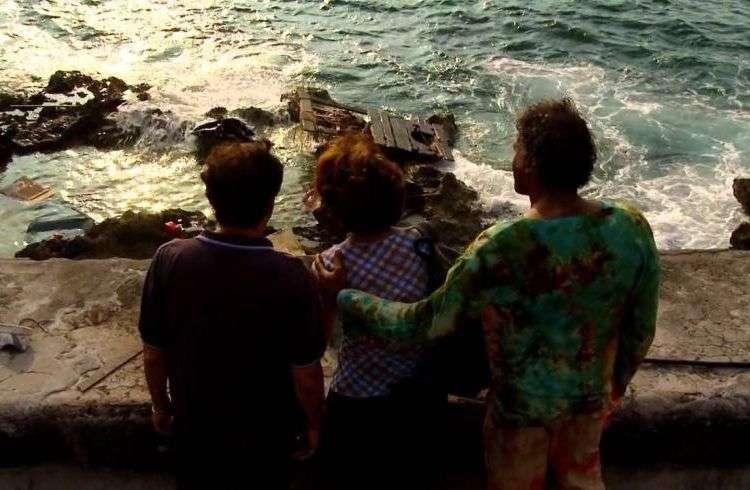Several controversies are unleashed by these days about Marilyn Solaya´s film Vestido de Novia, which won the prize of popularity in the last edition of the Film Festival in Havana. Issues related to piracy and copyright have been discussed in the blog Cine Cubano, la pupila insomne. However, there has not been a discussion about the film itself, or had been reported defects that hinder its quality.
The story can be genuine and made with the best intentions, with all the desire to denounce a homophobia still latent in the country, but if at the end of you did not do it plausibly, the film has no value, it is another case of it appeared to be but it was not. That is the first defect in Vestido…it does not convince.
One of its biggest problems is the limited use of climax moments of the film, mainly because the camera is not located in the best position. To give three examples: Rosa Elena (Laura de la Uz) discovers that her father has faked disability; Sissi (Isabel Santos) removes makeup in the mirror; Rosa Elena along with two supporting characters look at the sea in search of Sissi. Those are strong scenes, with a dramatic intent, but crumble by lack of skill.
Violence is another topic that is not treated in the best way in the film. Sissi is beaten in the police station by being transvestite, which is given to understand through bruises on her body but it is not shown explicitly. When the protagonists move through Havana during the called ¨maleconazo, ¨the police do not hit them, not even a drop of violence is displayed in one of the most critical moments in the history of the country; everything is resolved with a group of revolutionary activists who take the streets and the peaceful order forces. However, when Ernesto (Luis Alberto García) discovers the true identity of his wife, he punches her in the face, which is justified. And to accompany this fact, there are the violations which are shown very clear. How is it possible that the only acts of violence shown in the film are those where the victim is Rosa Elena?
The hostile environment and accumulation of adverse elements to the protagonist, sometimes exaggerated and unnecessary, end up nullifying scenes with an alleged sentimental or complaint load. When Sissi is giving food to the crippled elderly, she reproaches him all the abuse he committed with his daughter because of her sexual orientation, and in turn she rejoices because now he depends on the homosexuals he so despises. But everything is an illusion, there is no such dramatic moment. Rosa Elena’s father is who mocks the transvestite because he has no disease, can fend for himself, but decides to deceive them all.
This old man, incidentally, is the most negative characters in the film. He is so degenerate that does not try to prevent the rape of his daughter (or son) when he is in the next room. One might think that with this homophobic father the necessary share of evil is met, but no; the film has a gallery of villains comparable with that of a Mexican soap opera.
There’s Roberto (Mario Guerra): thief, traitor and rapist of transsexuals in his spare time. His presence is another sign of the need Cuban film directors have for making great social criticism, with all possible stereotypes. Then is Lázaro (Jorge Perugorría), playing the corrupt manager, full of free evil and barely with nuances. And Sandra, the head nurse (Alina Rodriguez), bitter and resentful, who delivers Rosa Elena’s file to reveal her identity. It also appears Pedro (Manuel Porto), the uncompromising communist who in a glimmer of humanity, after firing Ernesto, is opposed to the revelry on the cheated husband. Interestingly, the party cadre has a human gesture on the film, but not the homophobic father, the corrupt manager or the unscrupulous foreman.
And we have the case of “the blond”, a character in the film without a single line of dialogue who with looks and facial gestures intends to show some support for Ernesto, but the “social pressure” does not even allow him to pronounce a few words of condolence. This is pathetic, especially because at some point you expect something from that coworker….
The atmosphere of the film is so oppressive and depressing that Rosa Elena has neither a heterosexual friend, all her friends are segregated homosexuals (including her friend the choirmaster does not seem to have a clear sexual identity); not a coworker to talk to, or a neighbor to come to hear her screams during the rape. Nothing. Everything is horrible. And at the end of the film when happiness decides to smile at her, she chooses the hard way, as if to purge her sins. Sissi is disgusted and decides to leave the country. She doesn’t. In the fullness of martyrdom and self-flagellation, she decides to continue in the house where she was raped, living with a parent who has always despised her and reneging on the man who loves her. Why? Because she prefers pathos and suffering. Because the more shocking is the end, the more effect it will have on the public. And that has one name: crude manipulation.










